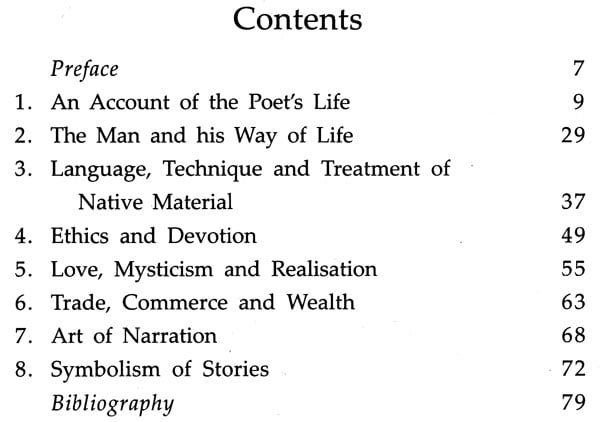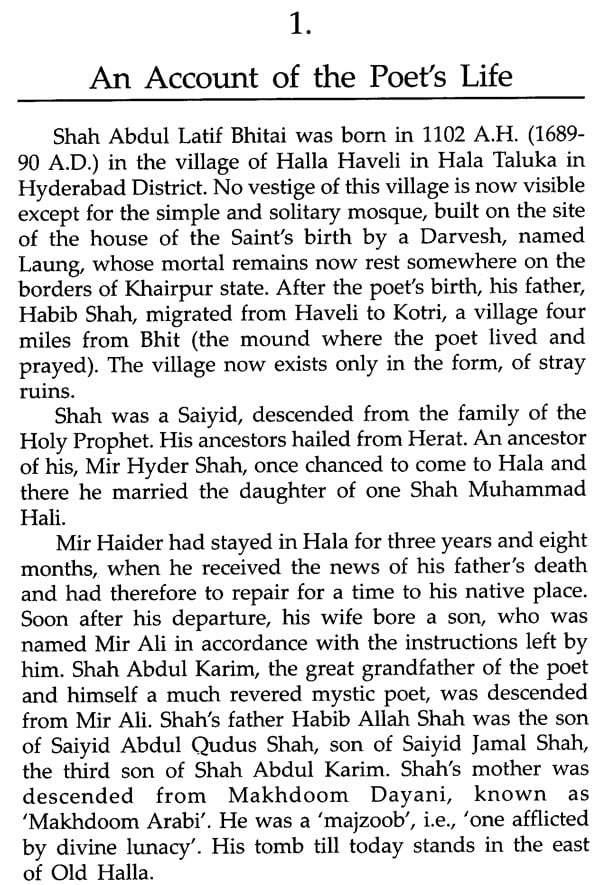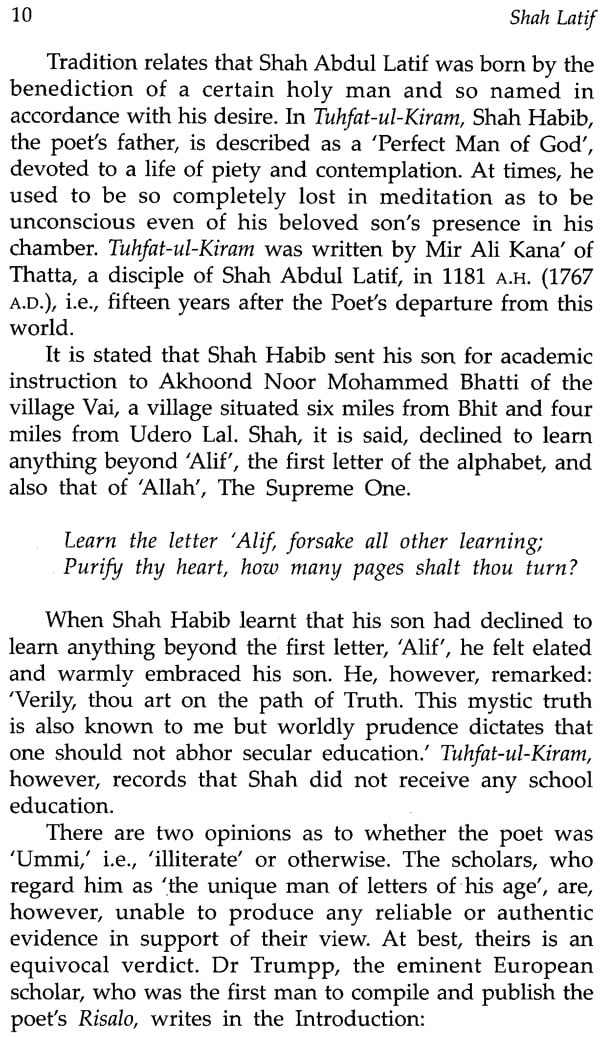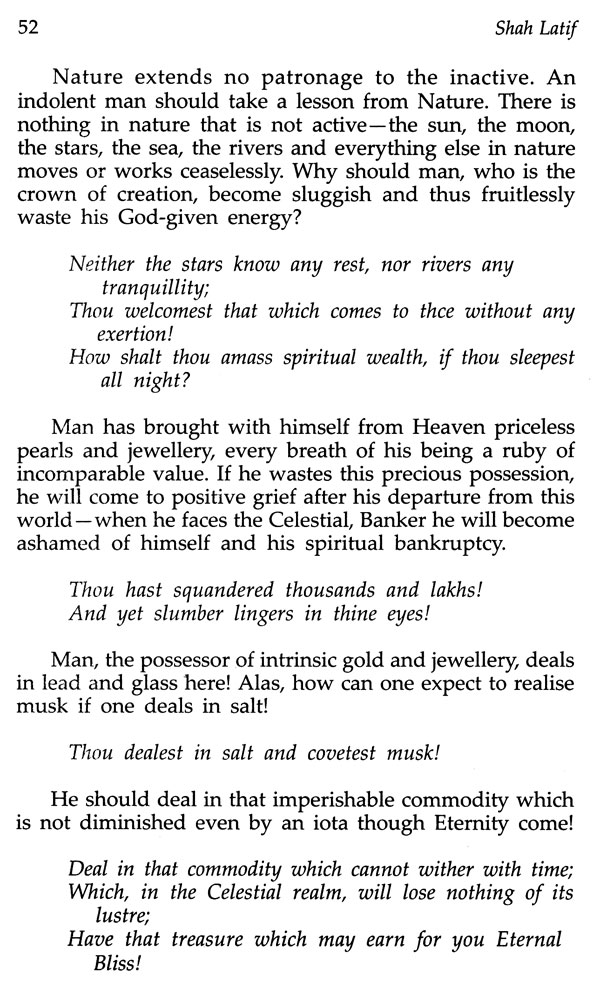
Shah Latif (Makers of Indian Literature)
Book Specification
| Item Code: | NAR061 |
| Author: | Kalyan Bulchand Advani |
| Publisher: | SAHITYA AKADEMI, DELHI |
| Language: | English |
| Edition: | 2017 |
| ISBN: | 9788126053230 |
| Pages: | 84 |
| Cover: | PAPERBACK |
| Other Details | 8.50 X 5.50 inch |
| Weight | 120 gm |
Book Description
Shah Abdul Latif Bhittai (1689 -1752) was a noted Sindhi Sufi scholar, mystic, saint, and poet, widely considered to be the greatest Muslim poet A the Sindhi language. He was a poet of the soil who has made immortal in his verse thc sights and sounds of his native land, the enchanting folk tales which are sung to this day in the villages of Sind and wherever Sindhis, of whatever class, nationality or religion, congregate. His collected poems were assembled in the compilation Shah Jo Risalo, which exists in numerous versions and has been translated into English, Urdu, and other languages. His work has been compared frequently to that of the Persian poet Rurni. Se,ed Hossein Nast, Professor of Islamic Studies at George Washington University, USA, described Shah Lad as a "direct emanation of Rumi's spirituality in South Asia."
Kalyan Bulchand Advani (1911-1994), the author of this monograph, was born in Hyderabad. A post-graduate in English Literature he was a teacher by profession.
1958 is an year to be remembered as a milestone in the history of Sindhi literature as he has published his work on legendary Sindhi poet Shah Sahib under the title .Sirah Risalo Mi,jamal which won him the Sahitya Akademi Award for Sindhi for 1968. In spits of his excellent command over English and Persian languages, Kalyan. Advani preferred to write in his mother tongue Sindhi. Though there is considerable less published books, but the greatest gift to Sindhi literature given by him is his critical work on the famous trio of Sindhi literature Shab-Satbal-Santi. Translation of Mahakavi Kalidas's Shakuntala in Sindhi is yet another towering achievement of Kalyan Advani.
Shah is the greatest and the most popular of Sind's Sufi poets. He ranks with the greatest poets of the world, whose names are permanently inscribed in the Chronicle of Time. He was a prophet and a seer and his verses are pearls of divine truth. His Risalo is a sacred work and a unique treasure in the Sindhi language.
Shah's saintly nature, his innate goodness and his singularly pure character and noble virtues have made him the idol of Sindhi hearts and touch all those who come in contact with his poetry.
I need not say here anything more about Shah Latif and his poetry than is incorporated in this modest volume. I, however, deem it an auspicious augury to quote here Rishi Dayaram Gidumal's glorious words in which he pays homage to our revered poet:
His was a genius Flowing like a crystal river Bright as light and clear as wind.
'He had that all "comprehensive tenderness", and that "all subtilizing intellect?" which have made his verses the delight and the solace of the learned as well as of the ignorant, of the Hindu as well as of the Moslem. The great lyrist, Hafiz, has been styled the Petrarch of Persia, and Abdul Latif has been styled the Hafiz of Sind. But both Petrarch and Hafiz fail to give a correct idea of the poetry of their Sindhi counterpart. Abdul Latif has wedded the beautiful national legends with the most transcendental truths and has given, thern a purity and a lustre, a tenderness and a pathos, rarely equalled and never surpassed. He not only wrote melodious songs but he lived melodious days. His life was so holy and so pure that Plato would hardly have had the heart to exclude him from that Model Republic, which had no place for charming and versatile poets! Abdul Latif was something more than a charming rhymer, he was a poet in the true sense of the word-a bright poet-a, powerful poet-and above all a saintly poet.'
I am grateful to the Sahitya Akademi for sponsoring and entrusting this work to me. In this concise volume, I have tried to touch, however briefly, the essential features of Shah Latif's life, philosophy and poetry. I have here confined myself to its defined scope and fervently hope that a more exhaustive study of the poet and his work will follow in not a very distant future.
**Contents and Sample Pages**










